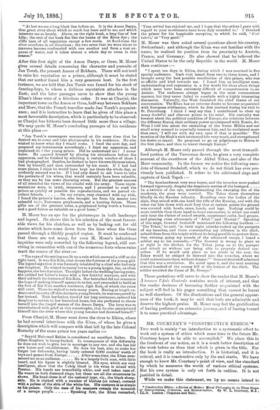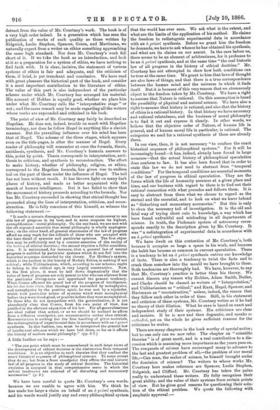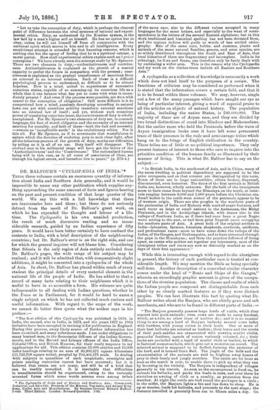MR. COURTNEY'S "CONSTRUCTIVE ETHICS." , THIS work is mainly "an introduction
to a systematic effort to work out a system of ethics which some time in the future Mr. Courtney hopes to be able to accomplish." We place this in the forefront of our notice, as it is a much better description of the work before us than that which is given in the title. For the book is really an introduction. It is historical, and it is critical, and it is constructive only by fits and starts. We have enough to know Mr. Courtney's point of view, and the standard by which he measures the worth of various ethical systems. But his own system is only set forth in outline. It is not justified in detail.
While we make this statement, we by no means intend to
• Constructive Ethics : a Review of Madan Moral Philosophy in its Thew Star* of Intoronstaion, Cliticism, and Reconstruction. By W. L. coartney, ILL, LL.D. London: Chapman and Hall. detract from the value of Mr. Courtney's work. The book is of a very high order indeed. In a generation which has seen the
publication of works of such quality as those written by Sidgwick, Leslie Stephen, Spencer, Green, and Martineau, we naturally expect from a writer on ethics something approaching the same high standard. Nor does Mr. Courtney's work fall short of it. If we take the book as an introduction, and look at it as a preparation for a system of ethics, we have nothing to find fault with. It is clear, incisive, the statement of various systems of ethics is fair and adequate, and the criticism of them, if brief, is yet trenchant and conclusive. We have read with great pleasure the historical part of the book, and consider it a. most important contribution to the literature of ethics. The value of this part is also independent of the particular scheme under which Mr. Courtney has arranged his material. His account of Hobbes is equally good, whether we place him under what Mr. Courtney calls the "interpretative stage" or not ; and the same remark may be made regarding all the writers whose works are expounded and criticised in his book.
The point of view of Mr. Courtney may fairly be described as Hegelian. He does not, indeed, trouble us much with Hegelian terminology, nor does he follow Hegel in anything like a slavish manner. But the prevailing influence over his mind has been that of Hegel. The scheme of the three stages, which appears even on the title-pages, is after the manner of Hegel. Every reader of philosophy will remember at once the formula, thesis, antithesis, synthesis, and Mr. Courtney's formula answers to this, point by point. Thesis corresponds to interpretation, anti- thesis to criticism, and synthesis to reconstruction. The effort to make history, whether of philosophy, religion, or ethics, correspond to the Hegelian formula, has given rise to endless toil on the part of those under the influence of Hegel. The toil has not been without result. It has thrown light on many dark places of history, and made us better acquainted with the march of human intelligence. Bat it has failed to show that the movement of history proceeds according to the formula. Nor has Mr. Courtney succeeded in showing that ethical thought has proceeded along the lines of interpretation, criticism, and recon- struction. He is fully conscious of this himself, as witness the following statement :—
"It needs a certain disengagement from current controversy to see this law of progress in its best, and in some respects its highest, exemplification—moral philosophy. On the one hand, we are met with the oft.repeated assertion that moral philosophy is wholly improgres- 'sive ; on the other hand, all general statements of the law of progress afford an easy mark for the ridicule of those who are occupied with the bare detail of systems and particular opinions. The first objec- tion may be sufficiently met by a counter.assertion of the reality of the history of ethical doctrine; the second requires a fuller considera- tion. It is maintained, for instance, that a general law of mental progress is nullified by particular systems which do not fall into the historical sequence demanded by the theory. Fur Hobbes's system, which is the earliest in the history of Modern Ethics, is nothing if not Critical; while Utilitarianism, which, according to our scheme, ought to belong to the critical age, is very largely constructive. Now, in the first place, it must be laid down dogmatically that the value of laws of progress are only patent to him who can abstract from the particular divergences and apprehend the general tendency. When Comte affirmed his grand law of the progress of intelligence, his /oi des trots etats, that theology was succeeded by metaphysics, and metaphysics by the positive spirit, he was met by a rejoinder, which took particular notice of systems which were metaphysical before they were theological, or positive before they were metaphysical. To those who do not sympathise with the generalisation, it is yet abundantly clear that Cumte, from his own point of view, was justified in the abstract exposition of his law. For all generalisations are ideal rather than actual, cr as we should be inclined to affirm from a different standpoint, are reconstructive rather than critical. Reconstruction is nothing but the free handling of given materials, the redintegration of experimental data in accordance with an a priori synthesis. In this fashion, too, must be interpreted the general law of intellectual advance which we have laid down, so far as it affects the history of modern moral philosophy." (pp. 6-7.) A little further on he says :— " The one point which must be remembered in such large views of the development of ethical doctrine is the abstraction from temporal conditions. It is DO objection to such theories that they confuse the exact historical sequence of philosophical systems. To some extent they do so ; but from a freer standpoint they affirm the real historic law of all progress in the study of ethical doctrine. The historical evolution is accepted in that comprehensive sense in which the salient tendencies are relieved of all disturbing and momentary accessories." (p. 9.) We have been careful to quote Mr. Courtney's own words, because we are unable to agree with him. We think he has made too large a claim on behalf of an a priori synthesis, and his words would justify any and every philosophical system that the world has ever seen. We ask what is the extent, and what are the limits of the application of his method. He claims the freedom to redintegrate experimental data in accordance with an a priori synthesis. Before we grant him the freedom he demands, we have to ask whence he has obtained his synthesis, and what are its claims on our assent. In the case before us, there seems to be an element of arbitrariness, for it professes to be an a priori synthesis, and at the same time "the real historic law of all progress in the history of ethical doctrine." Mr. Courtney has not attempted to show how both conditions can be true at the same time. We grant to him that laws of thought are also laws of things, and that there is a true correspondence between the human mind and the universe in which it finds itself. But it is because of this very reason that we strenuously object to the freedom taken by Mr. Courtney. We have a right to assume that Nature is rational. On this assumption is based the possibility of physical and natural science. We have also a right to assume that history is rational, and also that the history of ethics is a rational history. In that history we have necessary and rational relatedness, and the business of moral philosophy is to find it out and express it clearly. In other words, we believe that the objective order of Nature, of human life in general, and of human moral life in particular, is rational. The categories we need for a rational synthesis of them are already there.
In our view, then, it is not necessary "to confuse the exact historical sequence of philosophical systems." For it will be increasingly found—it has, indeed, already been found in large measure—that the actual history of philosophical speculation does conform to law. It has also been found that in order to state this law we do not need to abstract from "temporal conditions." For the temporal conditions are essential momenta of the law of progress in ethical speculation. They are the forms which the life of humanity assumes at a given place and time, and our business with regard to them is to find out their rational connection with what precedes and follows them. It is easy to abstract from them what we choose to regard as the eternal and the essential, and to look on what we leave behind as "disturbing and momentary accessories." But this is only to shun the necessary toil of investigation. It is the old and fatal way of trying short cuts to knowledge, a way which has been found unfruitful and misleading in all departments of science. In truth, the Ptolemaic system of astronomy corre- sponds exactly to the description given by Mr. Courtney. It was "a redintegration of experimental data in accordance with an a priori synthesis."
We have dwelt on this contention of Mr. Courtney's, both because it occupies so large a space in his work, and because the habit has become so common in current speculation. There is a tendency to let an a priori synthesis outrun our knowledge of facts. There is also a tendency to twist the facts and to crush them somehow into the mould we have brought to them. Both tendencies are thoroughly bad. We have, however, to say that Mr. Courtney's practice is better than his theory. We cannot discern any reason why Hobbes, Adam Smith, Butler, and Clarke should be classed as writers of "Interpretation," and Utilitarianism as "critical," and Kant, Hegel, Spencer, and Hartmann as "reconstructive," unless, indeed, the reason that they follow each other in order of time. Still, in his statement and criticism of these systems, Mr. Courtney writes as it he had no theory of their filiation. What he says is based on exact and independent study of their systems. His criticisms are clear and incisive. If he is now and then dogmatic, and speaks ea; cathedrci, yet on the whole he gives sufficient reasons for the criticisms he makes.
There are many chapters in the book worthy of special notice ; but to one only can we now refer. The chapter on "scientific theories" is of great merit, and is a real contribution to a dis- cussion which is assuming more importance as the years pass on. The conquests of scisnce have encouraged many to advance to the last and greatest problem of all,—the problem of our moral life,—Can man, the maker of science, be himself brought under the dominion of science ? The writers to whose works Mr. Courtney here makes reference are Spencer, Leslie Stephen, Sidgwick, and Clifford. Mr. Courtney has taken the pains really to understand these writers. He fully recognises their great ability, and the value of their systems from certain points of view. But he gives good reasons for questioning their solu- tion of the ethical problem. We quote the following with emphatic approval :—
"Let us take the conception of duty, which is perhaps the clearest point of difference between the rival systems of rational and experi- mental ethics. Duty, as understood by the liantian system, is the law laid by a man's higher self on himself. He has no option but to obey, unless he will cut himself off from all communion with the universal spirit which moves in him and in all intelligences. Every recalcitrant attempt is attended by that haunting remorse, which is nothing elect but the agony of feeling that he is a spiritual outcast, a moral pariah. How shall experimental ethics explain such an a priori conception ? We have already seen the attempt made by Mr. Spencer. There are two elements in daty,—authoritativeness and coercive- ness. Authoritativeness is explained as the growth of a mental capacity to prefer the future in comparison with the present ; coer- civeness is explained as the gradual transference of sanctions from an external to an internal relation. Each of these is a difficult psychological process to understand, so difficult as to be almost hopeless. How is a mind, united to experiences of suocessive conscious states, capable of so summing-up its conscious life as a whole that it can balance what has yet to come with what is imme- diately present ? And even if the process were possible, are we a whit nearer to the conception of obligation P Still more difficult is it to comprehend how a mind, passively developing according to natural laws, can yet with conscious activity transform external sanctions into an internal law of itself; and yet, without such conscious power of translating outer into inner, the coerciveness of duty is wholly unexplained. For Mr. Spencer's two elements of duty are, in common language, the fact of moral obligation and the necessity of an internal sanction for morality, and both of these—both the fact and necessity —remain as inexplicable surds' in the evolutionary ethics. Nor is this all. For Mr. Spencer, as if to accentuate that wastefulness in nature which the doctrine of evolution puts in such clear light, after all the laborious process of the growth of duty, mocks our difficulties by telling us it is all of no use. Duty itself will disappear. The evolved man in his millennial stage will have got the better of the 'Authoritativeness' and the Coerciveness.' The rationalised human being will in this case, as in all cases of association of ideas, see through his logical errors, and hereafter live in peace." (p. 273-4.)


















































 Previous page
Previous page